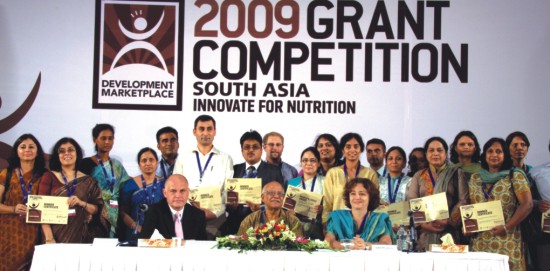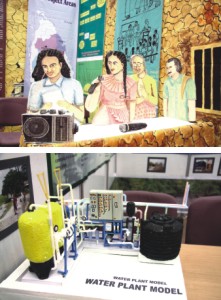Event
Borders without Hunger
Ahmede Hussain

Thirty-five-year old Kalini, who lives in Ulipur, has never been able to breastfeed her child. As she sits in the yard before her dilapidated thatched hut with her 10-month-old baby, one can see her jutting jawbones, her arms emaciated. The baby on her lap is not in good shape either: he was born premature; his weight at birth has surprised the doctors who work in one of the most poverty-ravished regions of Bangladesh. Kalini has fondly named her child Babar, after the founder of the Mughal dynasty. But chances are there that he is going to grow up malnourished and stunted. "A mother's milk can stop flowing for several reasons, of them one is extreme malnourishment. As he has never had his mother's milk, Babar might face a wide array of diseases," Dr Akmal Mahmud, says, "The worst thing is his immune system will be weak, he will be easily susceptible to diseases."
 Even though the cases of child under-nutrition fell during the nineties, it has not fallen in this decade. It is indeed a vicious cycle where poverty leads to malnourishment, and lack of nutrition, for its turn, produces an army of people who cannot give their best in studies or at work. So, economy suffers. The story of Kalini's poverty is entwined with the underdevelopment of Bangladesh. There is no surprise that the child underweight rate in the country is about 46 per cent. Without bringing hundreds of thousands of Kalinis and Babars in remote areas out of the clutches of abject poverty and deprivation Bangladesh will not be able to move on as a healthy and prosperous nation. Even though the cases of child under-nutrition fell during the nineties, it has not fallen in this decade. It is indeed a vicious cycle where poverty leads to malnourishment, and lack of nutrition, for its turn, produces an army of people who cannot give their best in studies or at work. So, economy suffers. The story of Kalini's poverty is entwined with the underdevelopment of Bangladesh. There is no surprise that the child underweight rate in the country is about 46 per cent. Without bringing hundreds of thousands of Kalinis and Babars in remote areas out of the clutches of abject poverty and deprivation Bangladesh will not be able to move on as a healthy and prosperous nation.
Isabel Guerrero, World Bank's vice President, South Asia Region agrees. “Undernutrition is one of the most challenging issues facing South Asia. Poor nutrition robs a child of a chance to succeed and live a healthy, productive life. And yet, an investment in nutrition is one of the social policy interventions that has the highest impact for each dollar spent, in improving this child's future,” she has said at the Bank's South Asia Regional Development Marketplace, held last week.
Explaining the idea of the marketplace, Humaira Rashid, Assistant Country Director, Concern Worldwide, says, "The Development Marketplace allows people to express their ideas and innovations in the way they want to and not in any pre-formatted way. This freedom allows them to explore their creativity."
At the market on the offer has been an $840,000 award; the focus has been on children under two years of age and pregnant women. Sixty organisations from Afghanistan, Bangladesh, Nepal, India, Pakistan, and Sri Lanka have vied for a grant up to $40,000 each to implement innovative ideas on how to improve nutrition in their respective countries; 21 projects have been successful.
At the end of the competition four proposals from Bangladesh have won grants; a Bangladeshi organisation has also won the People's Choice Award. The World Bank, the World Food Programme, the German Technical Cooperation (GTZ), Micronutrient Initiative, PepsiCo, UNICEF, the Gates Foundation, and the Global Alliance for Improved Nutrition (GAIN) have partnered to finance the Innovate for Nutrition- DM.
 One of the four Bangladeshi winners is International Centre for Diarrhoeal Diseases Research, Bangladesh (ICDDR, B), which advocates healthy feeding practice in the poverty-torn neighbourhoods through what it calls a performance-based payment. Highlighting the inequity between the slum and non-slum people, its project proposal says that, "Traditional birth attendants are a significant part of the informal health care system in the urban slums as they attend to almost 68 per cent of births. The project aims to use performance-based payment to the birth attendants to promote key infant and young child feeding in the slum population." One of the four Bangladeshi winners is International Centre for Diarrhoeal Diseases Research, Bangladesh (ICDDR, B), which advocates healthy feeding practice in the poverty-torn neighbourhoods through what it calls a performance-based payment. Highlighting the inequity between the slum and non-slum people, its project proposal says that, "Traditional birth attendants are a significant part of the informal health care system in the urban slums as they attend to almost 68 per cent of births. The project aims to use performance-based payment to the birth attendants to promote key infant and young child feeding in the slum population."
Training and Assistance for Health and Nutrition Foundation, another organisation that has been given a grant, works in both urban and rural areas. It "empowers" women and adolescents so that they can improve infant and young children's nutrition. The project plans to find women in different communities to train them as 'peer counselors', who will "promote exclusive breastfeeding, identify culturally acceptable and affordable complementary foods and provide a micronutrient mixture to the target beneficiaries."
The People's Choice Award has gone to a Bangladeshi civil society organisation called HIV/AIDS and STD Alliance Bangladesh (Hasab), which wishes to help sex workers and people living with HIV-AIDS to "improve the nutritional status of their children" who are under two years old.
The project of Concern Worldwide, which has also won a grant, wishes to "partner with the Kurigram municipality to improve infant and young child nutritional status of children in Kurigram." It aims to create leadership at the municipality level in the poor district who are going to "plan, coordinate and monitor" nutrition services for infants and young children. Kalini's hut is only about 20 miles away from downtown Kurigram. Every year seasonal unemployment comes after the aman harvest; a silent famine plagues this otherwise sleepy little Bangladeshi hinterland. Emancipation for Kalini is still a far cry.
Copyright
(R) thedailystar.net 2009 |
